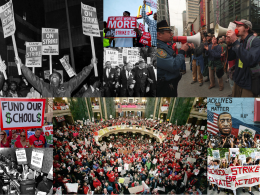The Grapes of Wrath by John Steinbeck, written 75 years ago, is one of the most celebrated books of the twentieth century, and with great reason. It details the harrowing struggle for survival in a period of depression and scarcity in 1930’s US.
Cultural tributes to the story have been paid by musicians stretching from Woodie Guthrie to Bruce Springsteen and the left-wing band, Rage Against the Machine. The story is timeless due to its examination of the social results of private ownership of land and industry and how the poor migrants of Oklahoma and other states coped during this period of social and economic decline and alienation.
The story is centred around two aspects; the Joad families’ struggle for survival during terrible and turbulent times, and Steinbeck’s beautifully written narrative account of the million nomadic families racing to find employment in California, a land which was fruitful with vast economic and environmental resources, though privately owned and controlled by a small few.
There are lessons to be taken from The Grapes of Wrath, especially for today. The Grapes of Wrath highlights the destructive and ruthless nature of capitalism and how the working class are choked and held at economic ransom by a group of small bourgeois institutions.
Millions were forced to compete against each other for terribly low wages which were dictated by a small wealthy South-Western elite. The same control over resources is evident today under neo-liberal capitalism and austerity, and although the majority of people in this country may not be starving, there is a huge scale of inequality which is shaking and threatening to destroy the foundations of our society. Youth unemployment is averaging around 30%, and in places like Limerick and Donegal it’s reaching a preposterous 50%. We may not be migrating as agrarian workers like those in the Grapes of Wrath, but thousands are leaving the country every month to emigrate as a result of this draconian system.
In The Grapes of Wrath, the question of economic democracy is brought to the fore. Economic democracy concerns the fair ownership and control of the economy by the many as opposed to the few. Nearly a century later, the question is still a vibrant and relative one for the working class of Ireland and the world as a whole. The Grapes of Wrath highlights how capitalism will never act in the interests of the working class and poor.
Immediately following the Dustbowl Era that’s depicted in the book, US President, Franklin D. Roosevelt admitted: “We have always known that heedless self-interest was bad morals; we know now that it is bad economics.”
This incredible novel that highlights the gross perpetuation of inequality that results from the malignant capitalist system should be read by every young person, worker or unemployed person who wants to inspiration to make change today.












